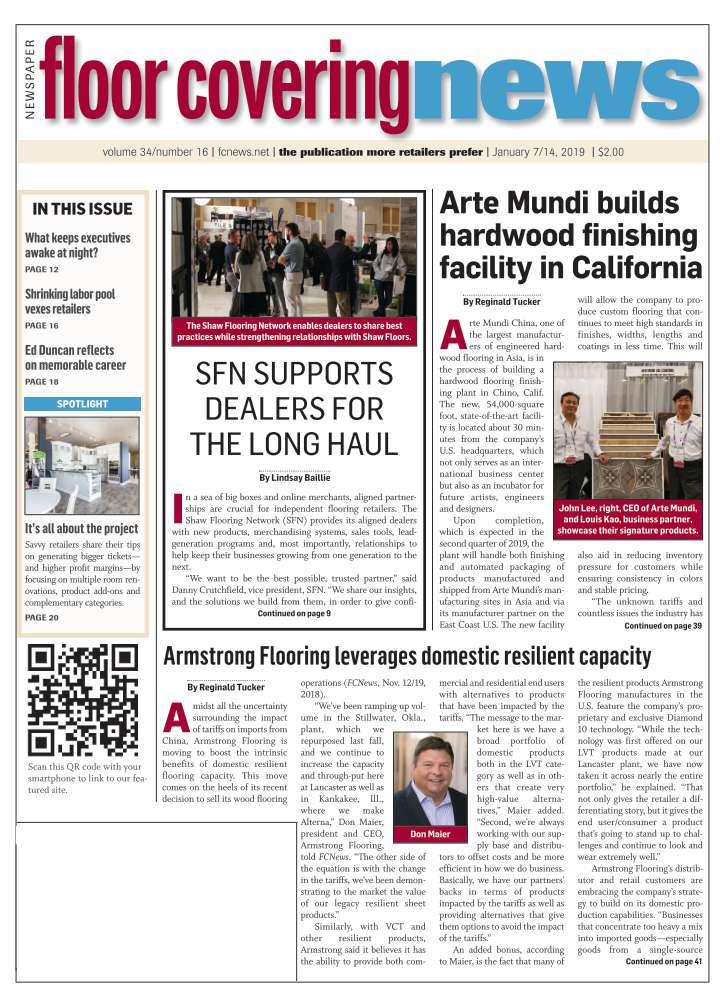January 7/14, 2019: Volume 34, Issue 16
By Reginald Tucker
 Amidst all the uncertainty surrounding the impact of tariffs on imports from China, Armstrong Flooring is moving to boost the intrinsic benefits of domestic resilient flooring capacity. This move comes on the heels of its recent decision to sell its wood flooring operations (FCNews, Nov. 12/19, 2018).
Amidst all the uncertainty surrounding the impact of tariffs on imports from China, Armstrong Flooring is moving to boost the intrinsic benefits of domestic resilient flooring capacity. This move comes on the heels of its recent decision to sell its wood flooring operations (FCNews, Nov. 12/19, 2018).
“We’ve been ramping up volume in the Stillwater, Okla., plant, which we repurposed last fall, and we continue to increase the capacity and through-put here at Lancaster as well as in Kankakee, Ill., where we make Alterna,” Don Maier, president and CEO, Armstrong Flooring, told FCNews. “The other side of the equation is with the change in the tariffs, we’ve been demonstrating to the market the value of our legacy resilient sheet products.”
Similarly, with VCT and other resilient products, Armstrong said it believes it has the ability to provide both commercial and residential end users with alternatives to products that have been impacted by the tariffs. “The message to the market here is we have a broad portfolio of domestic products both in the LVT category as well as in others that create very high-value alternatives,” Maier added. “Second, we’re always working with our supply base and distributors to offset and be more efficient in how we do business. Basically, we have our partners’ backs in terms of products impacted by the tariffs as well as providing alternatives that give them options to avoid the impact of the tariffs.”
An added bonus, according to Maier, is the fact that many of the resilient products Armstrong Flooring manufactures in the U.S. feature the company’s proprietary and exclusive Diamond 10 technology. “While the technology was first offered on our LVT products made at our Lancaster plant, we have now taken it across nearly the entire portfolio,” he explained. “That not only gives the retailer a differentiating story, but it gives the end user/consumer a product that’s going to stand up to challenges and continue to look and wear extremely well.”
Armstrong Flooring’s distributor and retail customers are embracing the company’s strategy to build on its domestic production capabilities. “Businesses that concentrate too heavy a mix into imported goods—especially goods from a single-source nation—remain exposed to significant financial, operational and logistical risks,” said Scott Rozmus, president and CEO, FlorStar Sales. “Having options available from global suppliers such as Armstrong Flooring, who have retained a domestic manufacturing base, certainly helps mitigate such tariff and related political risks.”
The fact that Armstrong Flooring operates a variety of plants across the country affords both the manufacturer and its distributors the luxury not only of offering some pricing stability relative to tariffs, but also providing benefits in terms of a more reliable supply chain, Rozmus added. “It is never a bad thing to eliminate multiple ports as well as oceans in terms of providing greater shipping accuracy. Offering customers more predictability creates happier customers.”
Among those happy customers are dealers like Merv Breckbill, co-owner of Strasburg, Pa.-based Wall to Wall Coverings, an Armstrong dealer for nearly 18 years. For him, domestic production provides more stability with respect to pricing.
“With the stuff coming in from overseas, along with the uncertainty of the price increases, anything that’s produced here in the U.S. is a plus. The other thing is domestic products are readily available. Most of the Armstrong Flooring products we order are available the same week, sometimes even next day, which is a big plus for us and our customers.”
Future plans
Beyond bolstering capacity of existing product lines, Armstrong Flooring also hinted at plans to begin manufacturing WPC-type products here in the U.S. “We have a team dedicated to bringing rigid core capabilities domestically,” Maier told FCNews. “I won’t offer a lot of details here other than to say we continue to make strong progress, and our intention is to repurpose existing assets we have just as we did in Stillwater.”
In this respect, Armstrong said it believes it also has an advantage. “The difference between us and other companies looking to establish rigid core production is we’re not looking for a greenfield site,” Maier stated. “Plus, we don’t have as many of the start-up related things that come along with that. Another benefit is it does not require as much capital investment.”

